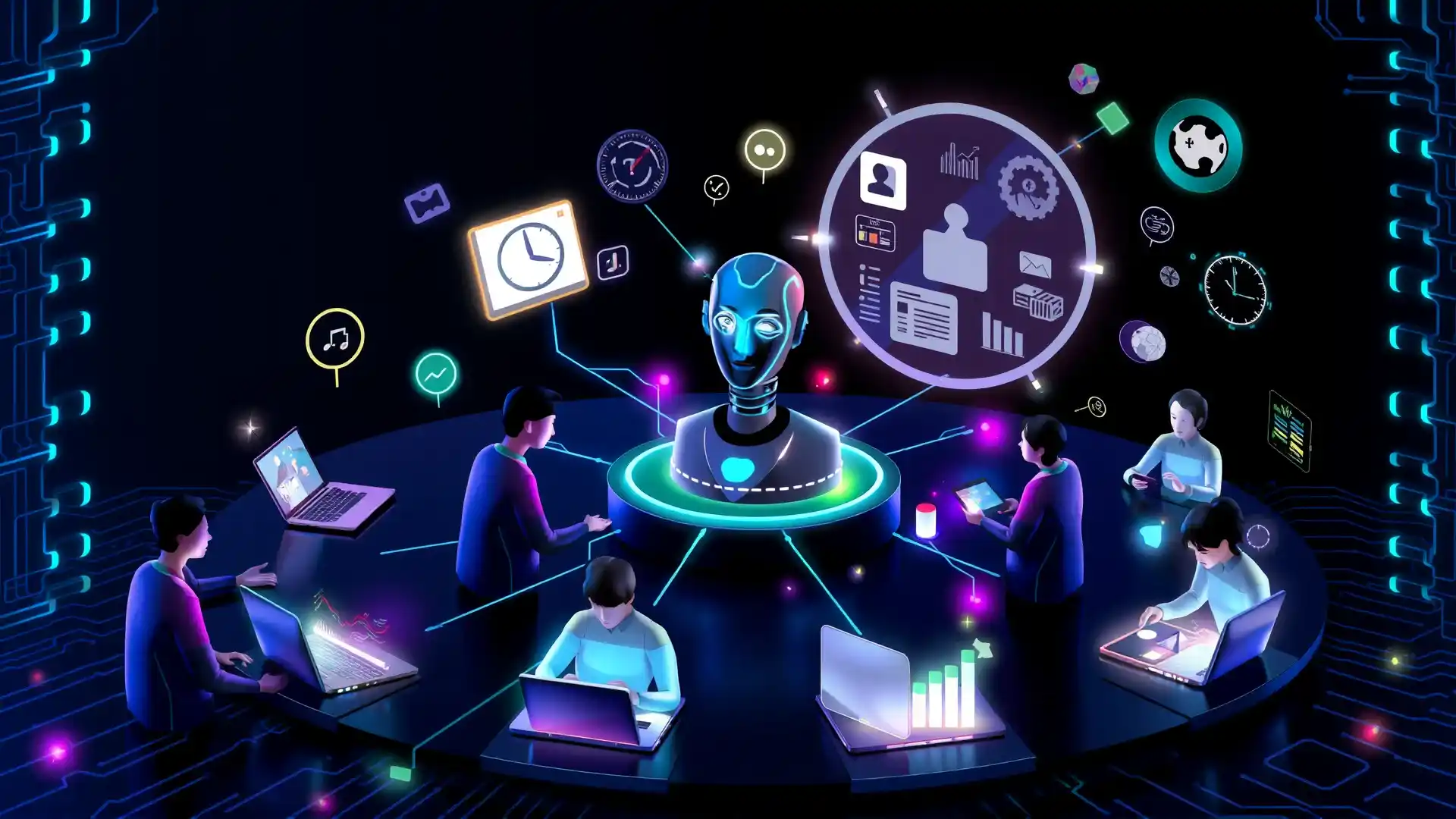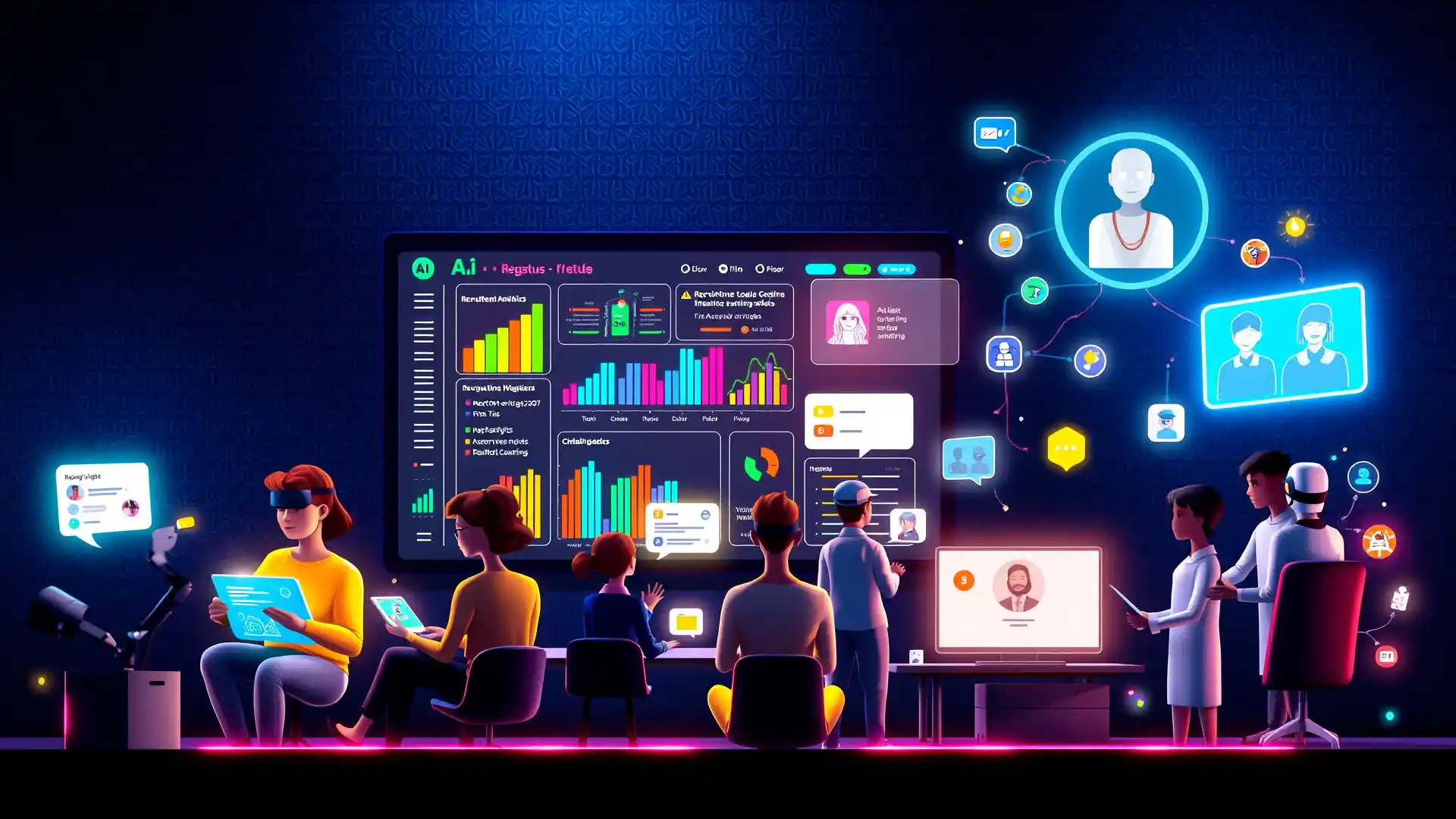Table of Contents
The competition in the talent marketplace is rising rapidly in the modern world. Old recruitment ways are slow, resulting in inefficiency delays and even losing magnificent talent. AI recruiting tools come up with the futuristic way which is to be wired for transforming the agencies toward the talent’s discovering or evaluating-and-onboarding process.
Certainly, using artificial intelligence at present brings a new dimension to hiring as it helps by streamlining the entire hiring process while reducing bias and improving judgment.
Understanding AI-Driven Recruitment Tools
AI-enabled recruitment tools use artificial intelligence to automate as well as improve some of the recruitment phases. They will manage large datasets and repetitive tasks, as well as provide predictive insights, thus giving recruiters more time to go into strategic activities like developing relationships with candidates.
Machine learning algorithms with natural language processing (NLP) and predictive analytics technologies are among the key technologies powering these tools toward creating a much faster and better hiring experience.

Advantages of Integrating AI-Driven Recruitment Tools in Recruitment
Improvement in productivity:
AI cuts down the time invested into boring repetitive process such as screening resumes: allowing recruiters to dedicate time in efforts towards strategic focus.
Increased Accuracy:
By minimizing human error and biases, AI ensures a fairer hiring processes and improved candidate match.
Improved Candidate Experience:
Chatbots and personalization make candidates feel valued and involved throughout the hiring process.
Time and Cost Efficiency:
AI tools, can make recruitment more effective because they look at every step in a recruitment process and eliminate unnecessary costs in the recruitment process but also enhance recruitment outcomes.
Insights-Bee Based:
These tools can provide insights into recruitment actions, thus enabling recruiters to decide on the basis of data analytics and emerging trends.
Challenges and Ethical Considerations By AI-Driven Recruitment Tools
Also it does pose challenges for adoption while the advantages of AI recruitment are otherwise obvious:
- Data Potential Bias: AI systems learn from historical data that carry biases in hiring decisions.
- Privacy Issues: Manage sensitive candidate information within appropriate security and transparency commitments.
- System Integration Challenge: Making AI tools work with already existing human resources systems is an ongoing problem.
This can be above all done through commitment to ethical AI practices, accountability, and regular auditing of algorithms to reduce biases by organizations. From the candidate side, an AI job search platform can improve the experience by surfacing more relevant roles, reducing mismatches, and aligning opportunities with individual skills and career preferences.
Examples of Leading AI-Driven Recruitment Tools
1. LinkedIn Talent Insights
Overview:
LinkedIn Talent Insights is not less than a data-centric platform that offers comprehensive insight into talent pools across the globe regarding the trends of workforce throughout the world. With such insights, organizations can comprehend labor market dynamics, competitor hiring activities, and skill distribution across specific locations.
Salient Features:
- Real-time data on talent availability and location.
- Insights into competitor talent strategies.
- Skill gap assessment for workforce planning.
- Custom dashboards for easy visualization.
Implication:
LinkedIn Talent Insights arms the organization to formulate dynamic hiring strategies by identifying rich pools in high-potential talent markets and aligning recruitment processes with talent marketplace activities. This strategic approach optimizes resource use and improves hiring efforts.
2. Hiretual
Overview:
Hiretual is an AI recruitment tool that tailors source and hire according to a candidate profile against job requirements. It integrates with a wide variety of platforms to provide a complete talent acquisition solution.
Specific Features Include:
- Over 750M Profiles for AI-Driven Candidate Sourcing.
- Automated Resume Screen and Ranking.
- ATS and CRM Compatible.
- Diversity Hiring to Meet DEI Goals.
- Pipeline Management and Collaboration Tools for Teams.
Impact:
Hiretual will speed up the hiring process by taking away some of the boring, manual tasks, like screening resumes and ranking candidates, allowing the recruiter to spend more time with the best candidates and reduce time to hire.
3. HireVue
Overview:
HireVue engages in video interviewing and AI-based assessments of candidates on spoken and unspoken communication. It’s high-end algorithms scrutinize how a person speaks, their tone, their facial expressions, and so on, to provide deeper assessments of the candidate’s performance.
Key Features:
- On-demand and live video interviews.
- AI-generated candidate assessment.
- Automated scheduling and assessment reports.
- Integration with major ATS platforms.
- Gamified assessments enable cognitive and behavioral measures.
Impact:
HireVue improves and streamlines the recruitment process by introducing assessments of soft skills and cultural fit, which inversely improve candidate-job matching. Additionally, it standardizes evaluations and reduces bias.
4. Entelo
Overview:
Entelo is the best diversity recruiting platform using AI to find and sourcing underrepresented talent. It will help create the tools which will help the organizations to build diverse teams as well as accomplish their diversity goals.
Salient Features:
- Diversity sourcing with AI.
- Predictive analytics for success of candidates.
- Automatically contacts candidates.
- DEI metrics reporting & Analytics.
- Integration with Applicant Tracking System for seamless workflow.
Impact:
Provides growth in inclusion practices using Entelo that help an organization to uplift its internal diversity practices. This is better representation within the workplace, and it needs to deal with talent gaps.
5. iSmartRecruit
iSmartRecruit is an AI-driven recruitment software platform designed to streamline the hiring process. It offers intuitive tools that help recruitment teams optimize candidate sourcing, screening, and hiring. Using AI, iSmartRecruit enhances recruitment strategies, improving efficiency and candidate experience worldwide for companies of all sizes.
Key Features:
- AI-Powered Candidate Matching: Automatically matches job descriptions with candidate profiles for faster and more accurate selections.
- Automated Resume Parsing: AI quickly scans resumes to identify top talent based on specific keywords and job requirements.
- Advanced Analytics: Provides actionable insights into recruitment performance, allowing businesses to make data-driven decisions.
- Customizable Workflow: Tailors the recruitment process to meet the specific needs of businesses, ensuring a more personalized approach.
- iSmartRecruit Integrations: Easily integrates with various job boards, HR systems, and social media platforms to expand sourcing channels.
Impact:
iSmartRecruit helps businesses save time by automating time-consuming tasks such as resume screening and candidate matching. With its AI-driven insights, it boosts recruitment efficiency, reduces time-to-hire, and ensures the hiring of high-quality candidates. Ultimately, this results in better talent acquisition and enhanced overall productivity for recruitment teams.
6. Pymetrics
Overview:
Pymetrics is a gamified assessment application for analysing the candidates’ emotional and cognitive traits using neurosciences games and these insights help in aligning candidates to jobs within which he/she can flourish.
Main Features:
- Gamified assessments for the candidate experience.
- Cognitive and emotional trait analysis.
- Machine learning algorithms for role fit prediction.
- Bias mitigation for fair assessments.
- Detailed reports to recruiters on the candidate .
Impact :
Pymetrics improves employees’ retention and satisfaction, evidenced in its alignment of candidate attributes against job requirements. Additionally, it ensures that objective hiring decisions are backed by data.
7. Mya Systems
Overview:
Mya Systems is a miraculous AI chatbot which tends to automate the communication between the candidates and does interview scheduling, and quite a few repetitive chores pertaining to recruitment. The conversational AI fulfills the most engaging requirements at every stage of the hiring.
Key Features:
- AI-powered chatbot for candidate support 24/7.
- Automated interview scheduling.
- Pre-screening of candidates and qualified candidates.
- Global recruiting: Multi-lingual support.
- Analytics to track engagements and improve processes.
Impact:
Mya enhances the experiences of candidates and keeps dropout rates to a minimum due to maintaining the lines of communication. It saves the recruiter time and allows him to direct his energies toward strategies for improving hiring activities.

Emerging Trends in AI-Driven Recruitment
Recruitment has been in continuous transformation by artificial intelligence. Futuristic patterns would include:
Advanced AI Assessments:
Tools would be developed further to evaluate potential soft skill traits in candidates along with leadership potential.
Hybrid and Remote Work Integration:
AI toolsets will increasingly evolve in assessing candidates’ compatibility in hybrid and remote work focusing on adaptability and collaboration within the business environment.
Predictive Workforce Planning:
AI would help organizations in forecasting the need for hiring and proactively planning their hiring programs.
Tailored Candidate Experiences:
Hyper-personalized experiences will be offered by AI tools in the future; recommendations of a job and that job application might fit an individual.
Conclusion
Recruitment is changing because of technology: AI recruitment tools are improving the speed, accuracy, and efficiency of the hiring process through automation and predictive insights.
As competition for talent grows, those organizations that have started using these tools will have a competitive edge in attracting and retaining top talent. The future of recruitment is there one needs to prepare for this transformation.
FAQs
1. What are AI-driven recruitment tools?
AI-driven recruitment tools utilize artificial intelligence to automate and enhance various stages of the hiring process, such as resume screening, candidate engagement, and predictive analytics, improving efficiency and reducing bias.
2. What are the primary benefits of using AI in recruitment?
The key benefits include improved productivity by automating repetitive tasks, increased accuracy in candidate matching, enhanced candidate experience through personalization, and cost efficiency by optimizing the recruitment process.
3. What challenges do organizations face when adopting AI recruitment tools?
Organizations may encounter challenges such as potential bias in AI algorithms, privacy concerns regarding candidate data management, and difficulties in integrating AI tools with existing HR systems.